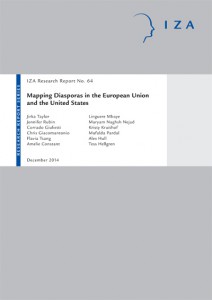Policymakers increasingly see possibilities in interacting with diaspora communities to improve relationships with their countries of origin and as a means to foster governance and rule of law, and political and economic development in those countries.
A new IZA Research Report on “Mapping Diasporas in the European Union and United States: Comparative analysis and recommendations for engagement”, conducted for the  European Commission collaboration with RAND Europe, provides an overview of diaspora communities in Europe and the US, with concrete recommendations for engaging with diaspora groups as a bridge to their countries of origin.
European Commission collaboration with RAND Europe, provides an overview of diaspora communities in Europe and the US, with concrete recommendations for engaging with diaspora groups as a bridge to their countries of origin.
Key findings include:
- The authors identified 339 diaspora groups from 24 selected countries of origin currently present in the European Union and the United States. Of these, 269 groups were sufficiently large to be included in the in-depth analysis, most of them located in EU-15 countries.
- In comparison with the populations of their countries of origin, diaspora groups achieve better outcomes overall on a range of socioeconomic indicators.
- The comparison with the populations of receiving countries offers a more complex picture.
- Diasporas are increasingly seen as important partners for both sending and receiving country governments’ strategies aimed at improving political, security and economic outcomes.
- Measured levels of engagement between diaspora organizations and their partners were positively correlated with the organizations’ measured level of satisfaction with that engagement.
- Proactive communication is desired from actors wishing to engage with diaspora organizations.
- Concrete ways to engage with individual diaspora groups need to take into account their characteristics and be tailored to specific contexts.